Data Governance
Transform your data into a strategic asset with quality, security, and operational efficiency.
Data Governance Strategy
"A solid Data Governance strategy ensures data quality, operational efficiency, and safer decision-making for your organization's success."
The evolution of data needs within organizations has grown significantly over time. More and more systems are being incorporated into companies, more users need access to and consumption of information, etc. This confirms what has long been stated: data is part of the organization's assets.
At the same time, requirements have arisen for organizations regarding the use and handling of information, ensuring that data is not vulnerable and is always protected.
Benefits of a Governance Strategy
- Effective data management
- Ensures data quality
- Guarantees security
- Improves operational efficiency
Assessing the above points may lead to the importance of establishing a strategic approach to Data Governance.
Fundamental for your business's BI, AI, and advanced analytics.
Control, protect, and maximize the potential of your information.
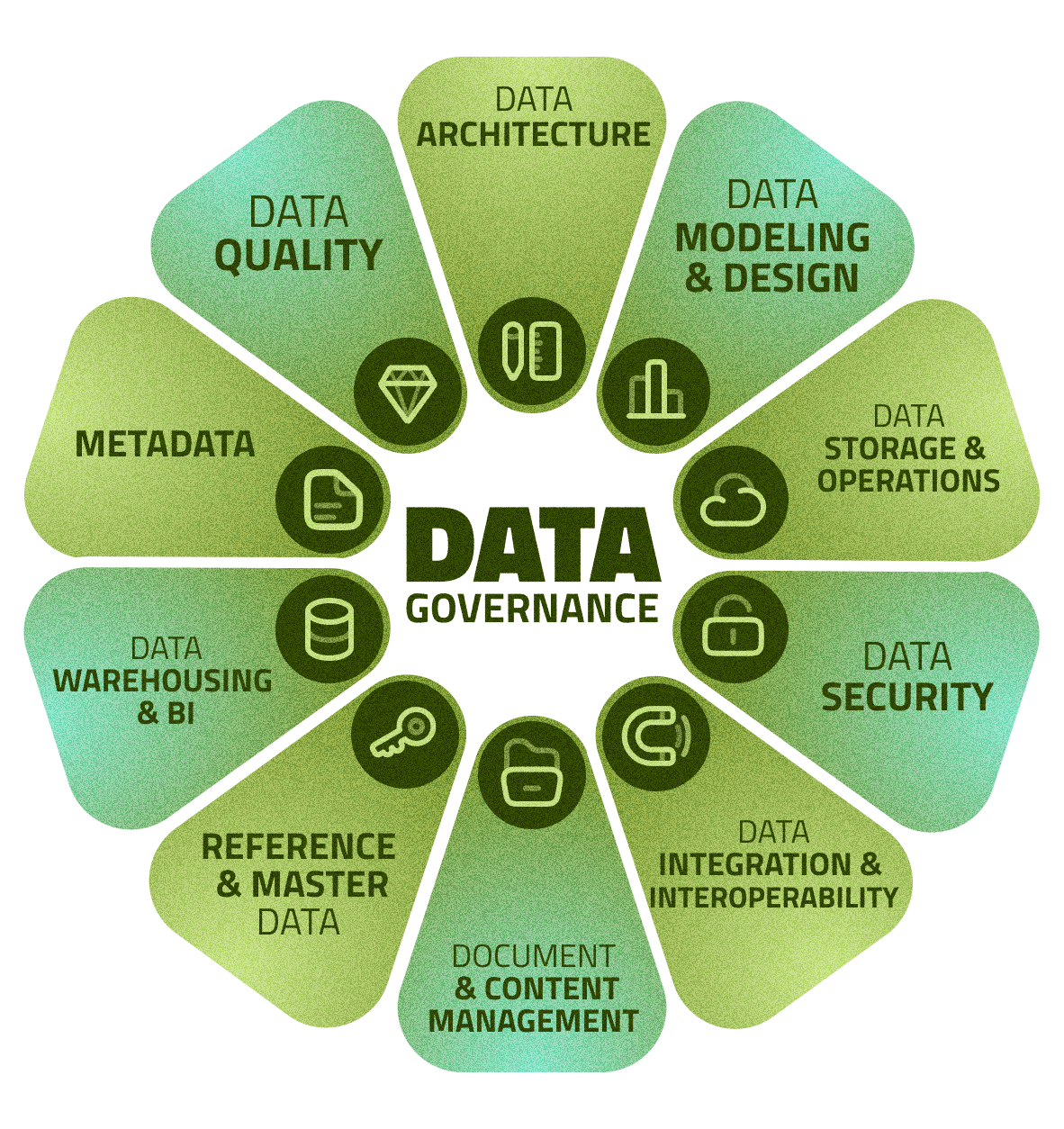
Our Approach
Based on our experience, we understand that each organization is unique and faces specific challenges. For this reason, we offer personalized support to develop and implement data governance strategies tailored to their needs.
Our approach covers everything from the initial evaluation and focus to the development and implementation of the strategy, as well as its follow-up.
- Detailed analysis of the current state of data management.
- Identification of strengths, weaknesses, and improvement opportunities to design an effective strategy.
- Identification of priorities and application of the strategy in areas such as security, quality, etc.
- We collaborate with your team to define a strategy aligned with business needs and established priorities.
- As a starting point, the statutes that will serve as the foundation of the strategy are established.
- We work simultaneously on functional and technical aspects to achieve tangible objectives.
- Continuous monitoring to ensure the strategy is effective, visible, and transparent.
- Periodic audits and necessary adjustments to the strategy.
- We support your organization in implementing the strategy by adopting best practices.
- Technological advice on tools to structure governance.
- We provide the tools and training needed to ensure the success of the strategy.
Framework
One of the key elements for articulating a data governance strategy is the framework. It provides the structure to manage policies and their outcomes in an orderly and meaningful way.
StrateBI advocates using the DAMA framework, as it offers broad coverage at different levels for everything related to data. Moreover, based on our experience, it is a flexible framework adaptable to any type of organization.
At StrateBI, we have developed a wide catalog of reference policies covering all DAMA chapters, allowing for an agile start and development of the strategy. You decide which policies you want, and we provide the input to drive them—from definition to application.
Furthermore, examples are provided for each policy, making it easier to understand for members of the data office or committee, as well as business users. Here are a couple of examples:
Example 1: Policy “Elimination of Office Documents as Input Support” from the DAMA area “Documents and Content”
Description: This policy defines the workflow to avoid and eliminate office documents used for data input within the organization. It includes whether to develop custom software, acquire tools, etc.
Example: If data input is required for a new project, instead of creating a text or spreadsheet document, an online management system is used for direct input. When the need for software development or tool acquisition arises, a thorough evaluation is conducted to determine the most appropriate solution. This policy ensures greater operational efficiency, reduced errors and risks associated with manual handling, and better data integration across systems.
Example 2: Policy “Definition and Standardization of Master Data” from the DAMA area “Master Data Management”
Description: Defines standards and procedures for defining and standardizing the organization’s master data. It establishes what is considered master data, how it should be structured and organized, and the naming conventions and formats to be followed for consistency across the organization.
Example: Our organization has established a set of standards for defining and standardizing master data such as customers, products, and suppliers. For instance, the customer name field must follow the format “Last Name, First Name,” and the address field must include all necessary elements such as street, city, state, and zip code. Naming guidelines have also been created to ensure consistency, such as standardized abbreviations for product types.
Here are some of the tools we recommend to our clients:
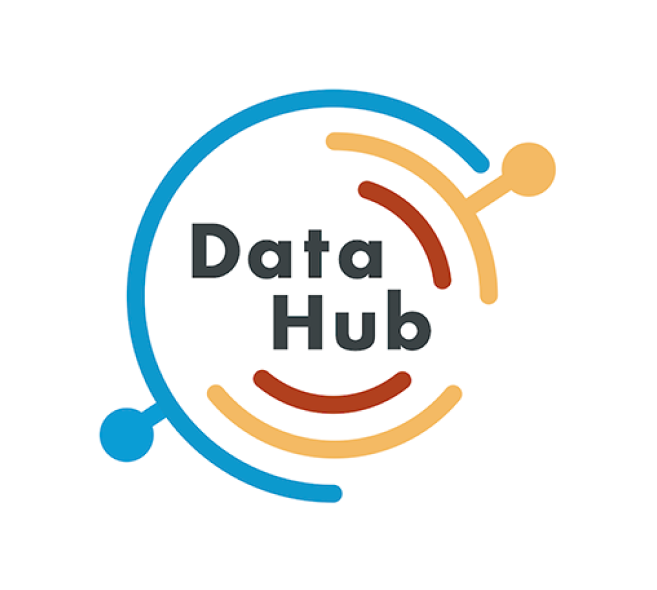
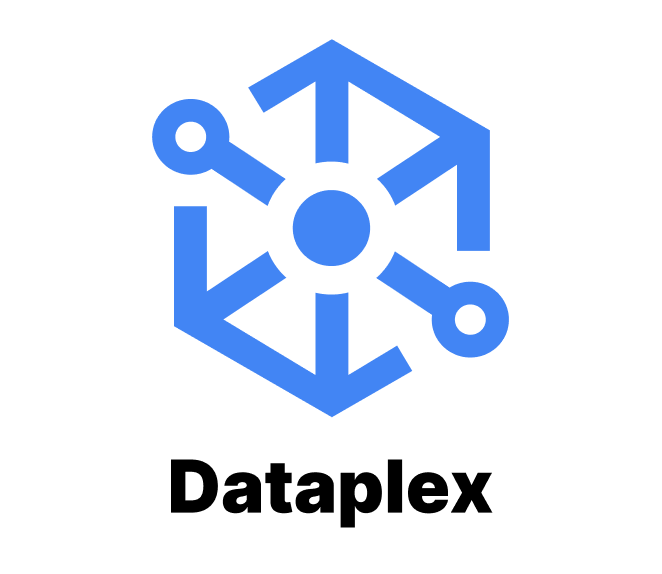
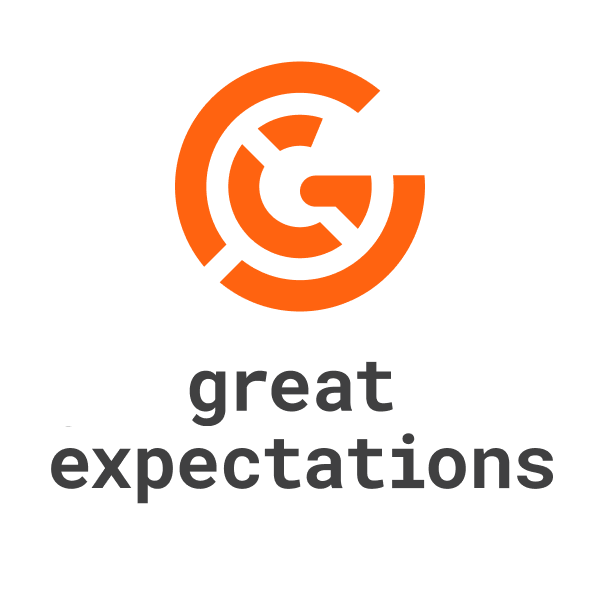
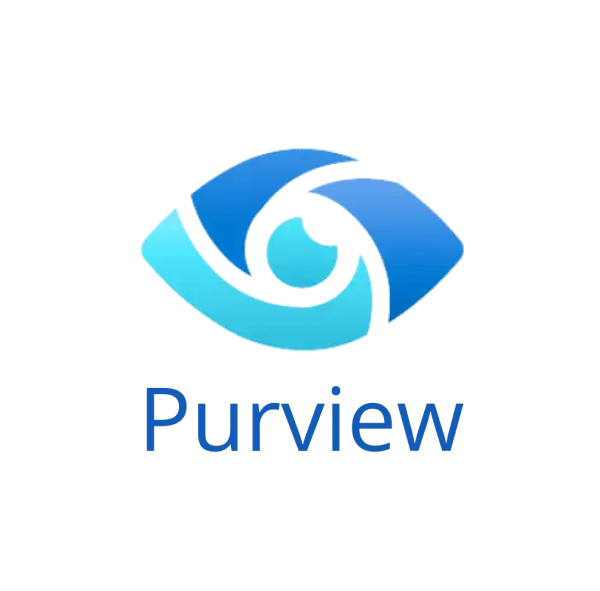
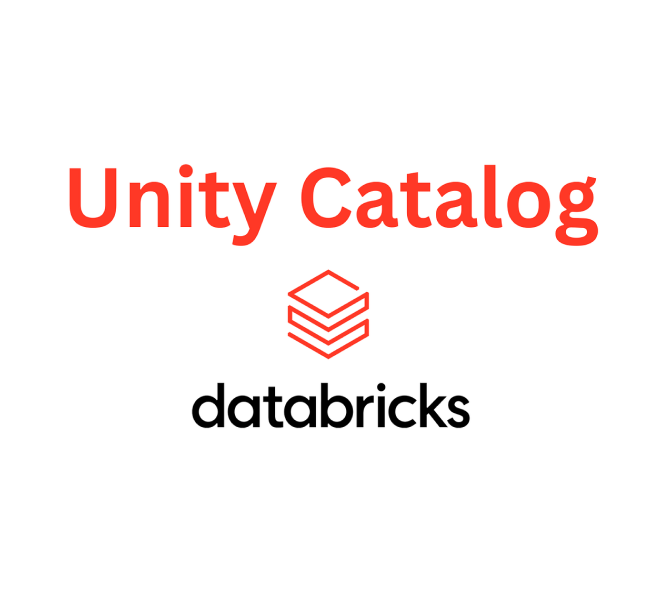
With StrateBI, governing your data is easier
"We’ve already talked about people, framework, and methodology, but we also provide the means to monitor the strategy."
From a management perspective, we offer a tool that allows you to:
- Identify which areas of the organization have implemented the strategy: Business process identification, data owners, and data stewards… and measure adoption speed.
- Know which systems are governed, considering aspects such as metadata extraction, classification, etc.
- Control governance policies, procedures, and standards. For each of these, determine which chapter of the DAMA framework they apply to, their status, and the dates of definition, approval, or application.
- Manage quality rules, including the type of quality issue (missing value, lack of referential integrity, etc.), the system it applies to, and the affected area and process of the organization.
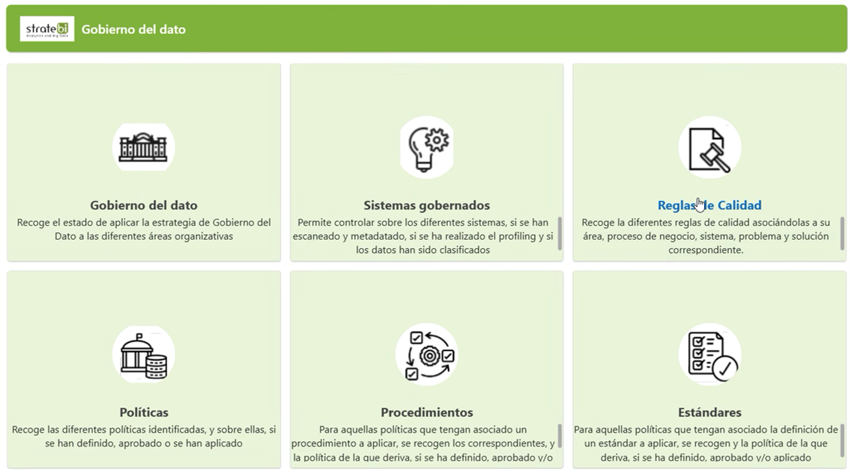
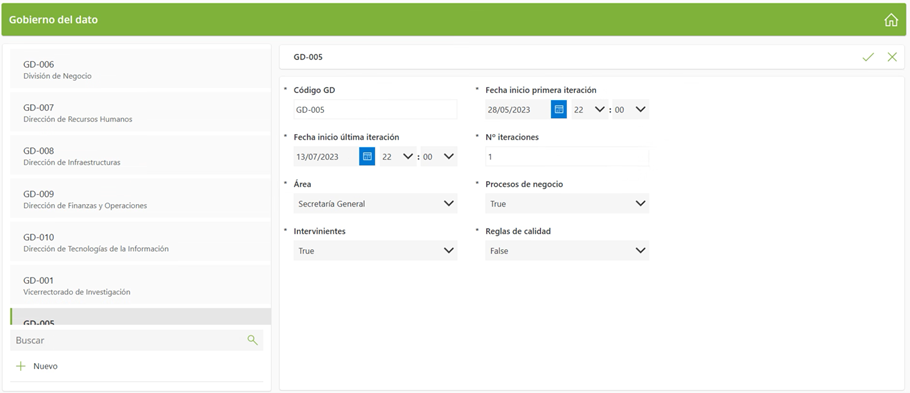
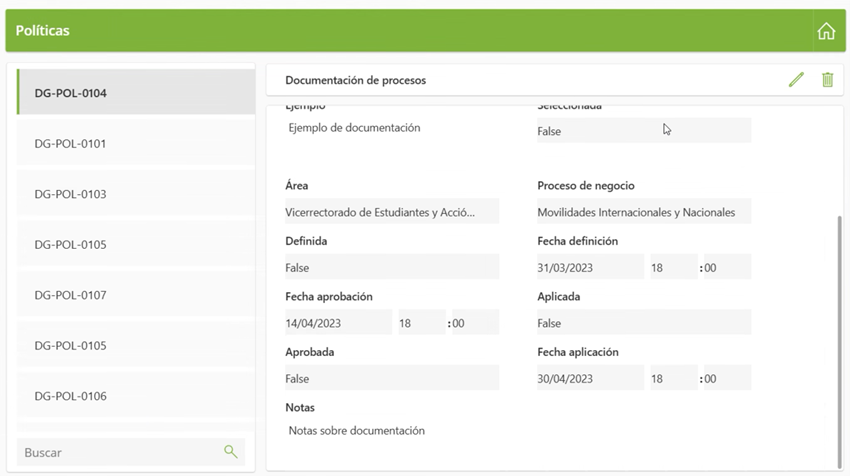
As a complement to the tool, we offer a dashboard for monitoring the strategy:
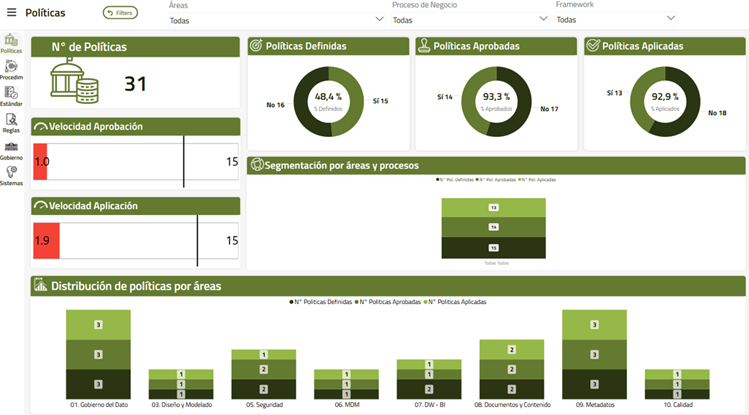
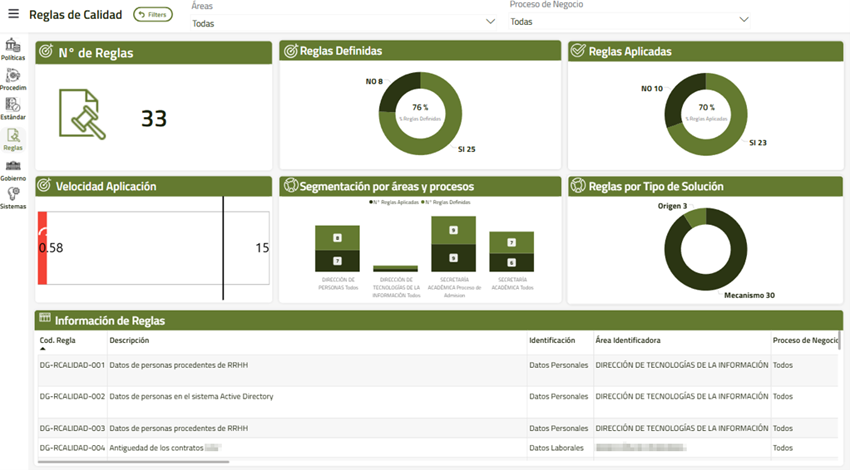

Methodology
A strategy on its own requires involved people, a reference such as the framework, but also needs the lever to execute tasks. At StrateBI, we always say we’re more about doing than just telling. In each iteration, our methodology aims to address both functional and technical aspects to achieve tangible milestones.
Functional Aspects
- Introduction of governance strategy into company areas.
- Support for identifying business processes and terms.
- Support for identifying data quality issues.
- Management of functional policies.
Technical Aspects
- Implementation and configuration of governance tools (metadata, lineage, quality, etc.).
- Scanning for metadata extraction.
- Metadata classification.
- Implementation of quality rules.
- Application of technical policies.
We are the top specialists in Data Governance!



